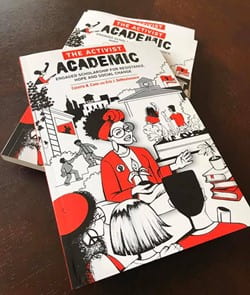 In this special book review series, authors will spotlight various resources addressing key ideas of community-engaged scholarship. The review essays offer perspectives on how stakeholders can co-create knowledge and build democratic communities.
In this special book review series, authors will spotlight various resources addressing key ideas of community-engaged scholarship. The review essays offer perspectives on how stakeholders can co-create knowledge and build democratic communities.
In this entry, Monica Reeves will review Teaching to Transgress: Education as the Practice of Freedom by bell hooks, 1994, Routledge.
 Though this book primarily calls for change in the U.S. educational system, the challenges outlined in Teaching to Transgress by bell hooks also apply to broader contexts of community engagement. hooks writes from a feminist critical perspective and was a long-time activist and professor who did provocative and powerful work. Written in 1994, this book still accurately describes some of the challenges facing teachers and students today. Inequity and racism in educational settings, difficulties in co-creating knowledge, and disinterest/lack of participation among students are among the topics that hooks addresses. These same systemic issues often appear in a similar way in other work settings, communities, and organizations. Much of what we do in public engagement aims to address problems rooted in racism and inequality. Working alongside stakeholders can be an arduous task as we try to bring positive change together, yet bring different goals, backgrounds, and levels of commitment. hooks writes with depth and vulnerability as she shares from her own personal experience and observations others experiences. To “transgress” is to push back on limits and beliefs that are destructive and often entrenched in our systems and organizations. The recommendations and stories of Teaching to Transgress can impact many settings outside of the classroom. This text is an important one for all who care about impacting their community and who claim to fight for equity and inclusion. Continue reading “Engaged Scholarship Book Reviews: Teaching to Transgress “
Though this book primarily calls for change in the U.S. educational system, the challenges outlined in Teaching to Transgress by bell hooks also apply to broader contexts of community engagement. hooks writes from a feminist critical perspective and was a long-time activist and professor who did provocative and powerful work. Written in 1994, this book still accurately describes some of the challenges facing teachers and students today. Inequity and racism in educational settings, difficulties in co-creating knowledge, and disinterest/lack of participation among students are among the topics that hooks addresses. These same systemic issues often appear in a similar way in other work settings, communities, and organizations. Much of what we do in public engagement aims to address problems rooted in racism and inequality. Working alongside stakeholders can be an arduous task as we try to bring positive change together, yet bring different goals, backgrounds, and levels of commitment. hooks writes with depth and vulnerability as she shares from her own personal experience and observations others experiences. To “transgress” is to push back on limits and beliefs that are destructive and often entrenched in our systems and organizations. The recommendations and stories of Teaching to Transgress can impact many settings outside of the classroom. This text is an important one for all who care about impacting their community and who claim to fight for equity and inclusion. Continue reading “Engaged Scholarship Book Reviews: Teaching to Transgress “

 Graduate students and faculty from Kansas State University’s
Graduate students and faculty from Kansas State University’s 


 Priest takes over the role from
Priest takes over the role from